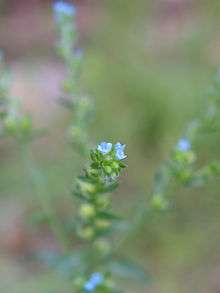Hackelia floribunda
Hackelia floribunda is a species of flowering plant in the borage family known by the common names large-flowered stickseed[1] and manyflower stickseed.[2]
| Hackelia floribunda | |
|---|---|
 | |
| Scientific classification | |
| Kingdom: | Plantae |
| Clade: | Tracheophytes |
| Clade: | Angiosperms |
| Clade: | Eudicots |
| Clade: | Asterids |
| Order: | Boraginales |
| Family: | Boraginaceae |
| Genus: | Hackelia |
| Species: | H. floribunda |
| Binomial name | |
| Hackelia floribunda | |
| Synonyms | |
|
Hackelia leptophylla | |
The plant is native to much of the western half of North America, in Canada and the Midwestern and Western United States
It is most often found in areas which are wet during the springtime, such as meadows, wetlands, and riparian areas.
Description
Hackelia floribunda is a lush biennial or perennial herb with hairy stems reaching a maximum height of about 1 metre (3.3 ft). They emerge as a leafy clump, surrounded by many smooth lance-shaped leaves up to 24 centimeters long.
There are few leaves at the ends of the stems, which hold cyme inflorescences of blue flowers. Each flower has five lobes with petallike appendages at their bases.
The fruit is a tiny, mildly prickly nutlet.
References
- "BSBI List 2007". Botanical Society of Britain and Ireland. Archived from the original (xls) on 2015-01-25. Retrieved 2014-10-17.
- "Hackelia floribunda". Natural Resources Conservation Service PLANTS Database. USDA. Retrieved 19 January 2016.
External links
- Calflora Database: Hackelia floribunda (Manyflower stickseed)
- Jepson Manual eFlora (TJM2) treatment of Hackelia floribunda
- UC CalPhotos gallery